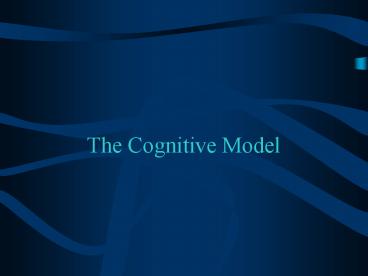The Cognitive Model PowerPoint PPT Presentation
1 / 40
Title: The Cognitive Model
1
The Cognitive Model
2
ThoughtEmotion Action
3
Anger - RedSadness - BlueFear - Yellow
4
Observer Actor
5
Behavior ModelCognitive Model
6
We often make inferences about other peoples
minds with a degree of confidence that is simply
not justified by the evidence.
7
SelfOthers Prospects
8
AttentionAwarenessAnalysisAlternativesAdaptati
on
9
Attention
10
Awareness
11
Analysis
12
Alternatives
13
Adaption
14
Choice
15
The Nature of Reflexive Thoughts often appear
in shorthand are almost always
believed experienced as spontaneous often
shoulds, oughts or musts tend to be
catastrophic
16
The Nature of Reflexive Thoughts are relative
idiosyncratic are persistent and
self-perpetuating often differ from public
statements repeat habitual themes are
learned are often unconscious
17
Consciousness
18
Listening, Practicing Recording
19
Analysis Dispute
20
Cognitive Errors Filtering Polarized
Thinking Overgeneralization Mind
Reading Catastrophizing Magnifying Person
alization Shoulds
21
Vocabulary Concepts PracticeStatement Patt
ern1. Ever since Lisa , Ive never trusted a
redhead. A. Filtering2. Quite a few people
here are smarter than me. B. Polarized
Thinking3. Youre either for me or against
me. C. Overgeneralization4. I could have
enjoyed the picnic, but the chicken was burnt. D.
Mind Reading5. Hes always smiling, but I
know he doesnt like me. E. Catastrophizing6.
Im afraid its over, s/he hasnt called me for
days. F. Magnifying7. You should never ask
personal questions. G. Personalization8.
These forms are impossible - Ill never get
finished. H. Shoulds
22
Changing Thoughts uncover evidence that
supports thought problems uncover evidence
that contradicts find alternative solutions
23
The Love ExperienceThe basic I/Thou concept
establishes the world of relations. As a thou, I
have no right to use the I before me as an object
with which I may take liberties. It is not for
me to play with or manipulate. I am not to use it
as a point of departure, or anything else. It is
a voice of a person that needs me. I am there to
help HIM speak. Walter Kauffman in Buber
24
Cognitive RestructuringSkill BuildingCulture
Restructuring
25
Principles Autonomous Persons Goal Seeking
Persons Enablers
26
Communication
27
Parent ParentAdult AdultChild Child
28
Techniques
29
Relaxation
30
Deep Breathing
31
Visualization
32
Progressive Muscle Relaxation
33
Worry Control
34
Risk Assessment
35
Worry Exposure
36
Coping Imagery
37
Stress Inoculation
38
Activity Scheduling
39
Problem SolvingState Your ProblemOutline Your
GoalsList Your AlternativesView the
ConsequencesEvaluate Your Results
40
References Resources

